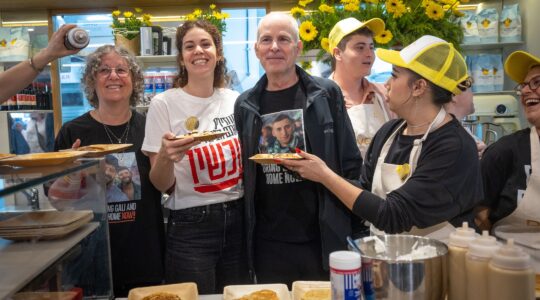WASHINGTON (JTA) — Turkey’s Jews are pleased as can be that for the first time, a Jew will be representing their country at the Eurovision song contest.
But the singer, Can Bonomo, isn’t exactly trumpeting his accomplishment — at least not the Jewish part.
“We would like to inform that Mr. Can Bonomo is bound to refuse answering all the questions about his religious beliefs, anti-Semitism and political subjects,” Bonomo’s spokesman, Ece Kahraman, wrote in a statement to JTA.
Bonomo has taken pains to tell fans that he will be participating in Eurovision as a Turk, not as a Jew.
“My family came from Spain 540 years ago,” Bonomo said in an interview on the “Aksam” news show in a video posted Jan. 11 that has gone viral. “I am Turkish and I am representing Turkey, I will go out there with the Turkish flag and represent Turkey. I am an artist, a musician. That’s all that everybody needs to know.”
Prior to his appearance on “Aksam,” radical right-wing papers had accused Bonomo of being a tool of Zionists and Freemasons.
The way in which the anchor framed her question in the interview probably didn’t put him at ease.
“People might say you were chosen because Turkey wants to ingratiate itself with Israeli lobby groups,” she said. “I would like to get your comments.”
The intimation that the state-run Turkish Radio and Television Corp., which makes the Eurovision selection, would kowtow to pro-Israel groups seems a little bizarre with Turkey’s moderate Islamist government doing its best to distance itself from Israel. One of the string of crises that fueled the current tensions between the two countries, in fact, was the broadcast in 2010 on state-run TV of a drama series that portrayed Israelis as harvesting organs from Iraqis.
It is true that Bonomo’s selection for the contest, which is being held in May in Baku, Azerbaijan, has sparked a glint of hope among Turkey’s 20,000 Jews, who have watched anxiously as their country’s historically strong relations with Israel have deteriorated.
“It is the first time in history that a talented young Turkish Jewish singer will represent Turkey in the Eurovision Song Contest,” Derya Agis, a scholar of Turkish Jewish culture and history at Brandeis University, wrote on her Facebook page. “Turkey will show the importance of diversity in Europe where anti-Semitism, Islamophobia, and xenophobia have been problems since centuries.”
Or, put a little less academically by Denise Saporta, a spokeswoman for Turkey’s Jewish community: “A Jewish boy is going to represent Turkey!” she told JTA. “We’re all very proud.”
Saporta downplayed the attacks on Bonomo, saying they were typical of political factions that deride minorities in general and are not representative of Turks.
“This always happens with ‘firsts,’ ” she said. “If he were anything other than a Sunni Muslim male — a woman, even — these media would attack.”
Going by his Facebook fan page, Bonomo has a solid following among Turks of all stripes. The video of the “Aksam” interview drew hundreds of comments in support. One fan, Osman Kural, denounced the “radical, right wing agitprop” and said it “in no way represents all of the country.”
Bonomo, 24, oozes hip, from his retro caps and his blazer over T-shirt look. His Twitter biography describes him as “musician/illustrator/writer/drunk/bast’E’rd. (- Chill dude.).” (His facility with English is another factor riling Turkish ultranationalists.)
EuroVisionary, a Eurovision fan site, describes the singer-songwriter’s style as “Istanbulian music that works with tunes from Alaturca to international indie style” with the Shins, Wax Poetic, the Kinks, the Libertines and the Beatles listed by the site as his influences. His vocals incorporate the rising and falling quartertones typical of his country’s music, and are set against throbbing drums and guitar and oud riffs.
Should Bonomo, who was born in the coastal city of Izmir, decide one day to shuck off his hesitancy about his Jewish roots, he might discover how they informed his music.
Jewish cafe singers drew crowds in the 1920s and 1930s with their modernized versions of their parents’ aching and ancient Ladino love ballads. A number of their modern Israeli interpreters, including Hadass Pal-Yarden and Yasmin Levy, have taken their acts to Turkey and won acclaim.
JTA has documented Jewish history in real-time for over a century. Keep our journalism strong by joining us in supporting independent, award-winning reporting.





